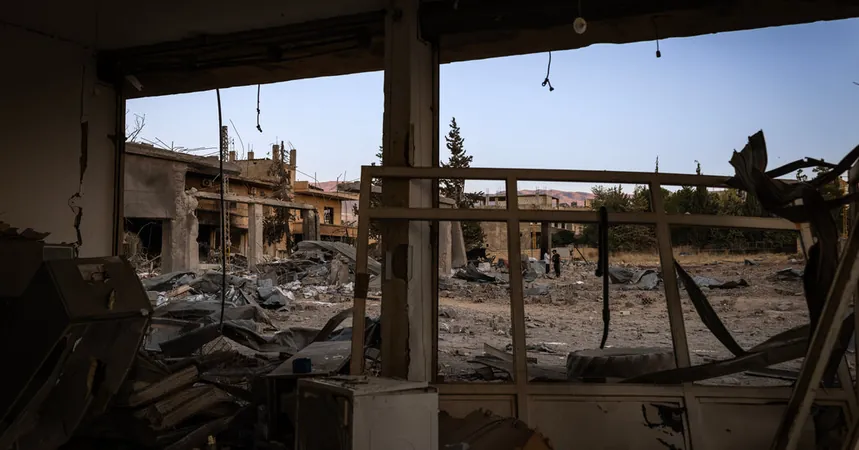
Cease-Fire Efforts Stumble Amid Intensifying Israel-Hezbollah Conflict: Latest Insights
2024-09-26
In an escalating conflict that has raised global concern, the Israeli government's rejection of a proposed cease-fire with Hezbollah has reinforced fears of a prolonged war in Lebanon. The sentiment was echoed widely across the Israeli political landscape, with lawmakers and officials voicing strong opposition to any pause in military operations. While Prime Minister Benjamin Netanyahu's office has not publicly dismissed the cease-fire proposal, it remains evident that significant challenges lie ahead in achieving peace between the two parties.
American diplomats have been engaging with Israeli leaders, continuously exploring potential diplomatic solutions, yet discussions of a full cease-fire remain fraught. Two senior Israeli officials, speaking under the condition of anonymity, revealed ongoing dialogues between Israeli and U.S. representatives, indicating a slight openness to the idea, albeit cautiously.
As tensions escalate, the situation on the ground has deteriorated further. A French official warned that the current hostilities could spiral into an all-out war, stressing the "narrow window" for a successful cease-fire. This collaborative proposal is the result of extensive coordination between France and the U.S., which has primarily engaged with Israel.
Military actions intensified with Israel responding decisively to rocket attacks from Hezbollah, resulting in extensive airstrikes across southern Lebanon. The Israeli military confirmed action against 45 rockets that were launched into northern Israel, and subsequent strikes reportedly led to the deaths of numerous civilians and individuals connected to Hezbollah.
Humanitarian implications are dire; the Lebanese health ministry has recorded hundreds of fatalities as a direct result of Israeli airstrikes. The scales of displacement are staggering, with estimates suggesting that over 500,000 people are now fleeing from their homes in Lebanon, creating a humanitarian crisis that is worsening by the day. The roads leading to Beirut are congested as civilians seek refuge from the violence.
While the situation in southern Lebanon captures attention, many Palestinians in Gaza express concern that the international focus might shift away from their ongoing struggles. Families of Israeli hostages fear that their plight may fade from the limelight as Israel concentrates its efforts northwards against Hezbollah.
For nearly a year, Israel has been engaged in a military campaign against Hamas in Gaza, a conflict that ignited following brutal attacks from the militant group on October 7. Hezbollah, expressing solidarity with Hamas, has actively engaged in hostilities against Israeli targets since the onset of the war in Gaza.
Israeli military leaders have begun preparing for a potential ground invasion aimed at crippling Hezbollah's military capabilities. This preparation includes mobilizing additional troops and conducting extensive airstrikes, making this one of the largest military campaigns seen since the war with Hezbollah in 2006.
The nature of Hezbollah complicates cease-fire negotiations. The group functions as both a military and political entity, making it challenging to pinpoint authority and responsibility within Lebanon’s fragmented political landscape. Analysts note that any enduring diplomatic resolution will require Hezbollah’s acquiescence, yet the group has firmly maintained that it will not relent until a cease-fire is established in Gaza.
Among the Israeli officials, sentiments lean towards a hardline approach. They argue that ongoing military pressure is essential for ensuring that Hezbollah cannot rearm or regroup. Generals advise a strategy focused on defeating Hezbollah’s capabilities while also calling for the integration of diplomatic efforts alongside military action.
Hezbollah, bolstered by Iranian support, shows little indication of capitulating. Recent statements from leaders, including Hassan Nasrallah, affirm the group's commitment to fight until they see a substantial change in the situation in Gaza. Meanwhile, it remains uncertain whether the Iranian government will exert influence over Hezbollah to build momentum towards de-escalating the conflict.
As the latest cease-fire proposal surfaced amidst this chaos, it couldn’t be more apparent that the stakes are incredibly high for both sides, with lives hanging in the balance. The potential for further escalation looms large, placing an increasing burden on local communities and the international community to find a sustainable resolution.
What’s Next? The Future of Lebanon's Stability Hangs in the Balance!
As the military and diplomatic efforts unfold, the world watches with bated breath, questioning whether peace will return, or if the region is destined for another chapter of violence. Will international actors succeed in fostering a resolution, or will the belligerents remain entrenched? The clock is ticking, and hope is running thin!
 Brasil (PT)
Brasil (PT)
 Canada (EN)
Canada (EN)
 Chile (ES)
Chile (ES)
 España (ES)
España (ES)
 France (FR)
France (FR)
 Hong Kong (EN)
Hong Kong (EN)
 Italia (IT)
Italia (IT)
 日本 (JA)
日本 (JA)
 Magyarország (HU)
Magyarország (HU)
 Norge (NO)
Norge (NO)
 Polska (PL)
Polska (PL)
 Schweiz (DE)
Schweiz (DE)
 Singapore (EN)
Singapore (EN)
 Sverige (SV)
Sverige (SV)
 Suomi (FI)
Suomi (FI)
 Türkiye (TR)
Türkiye (TR)